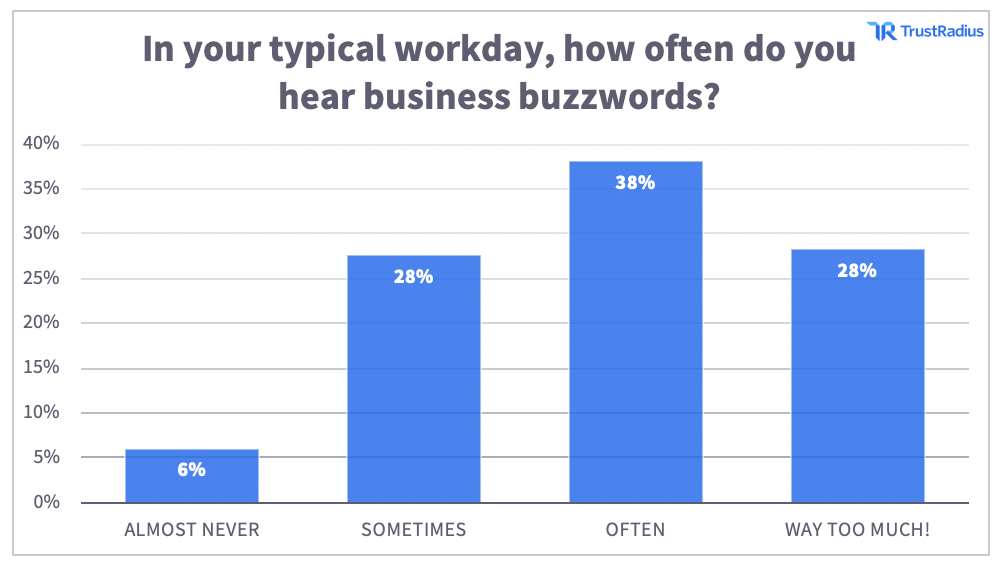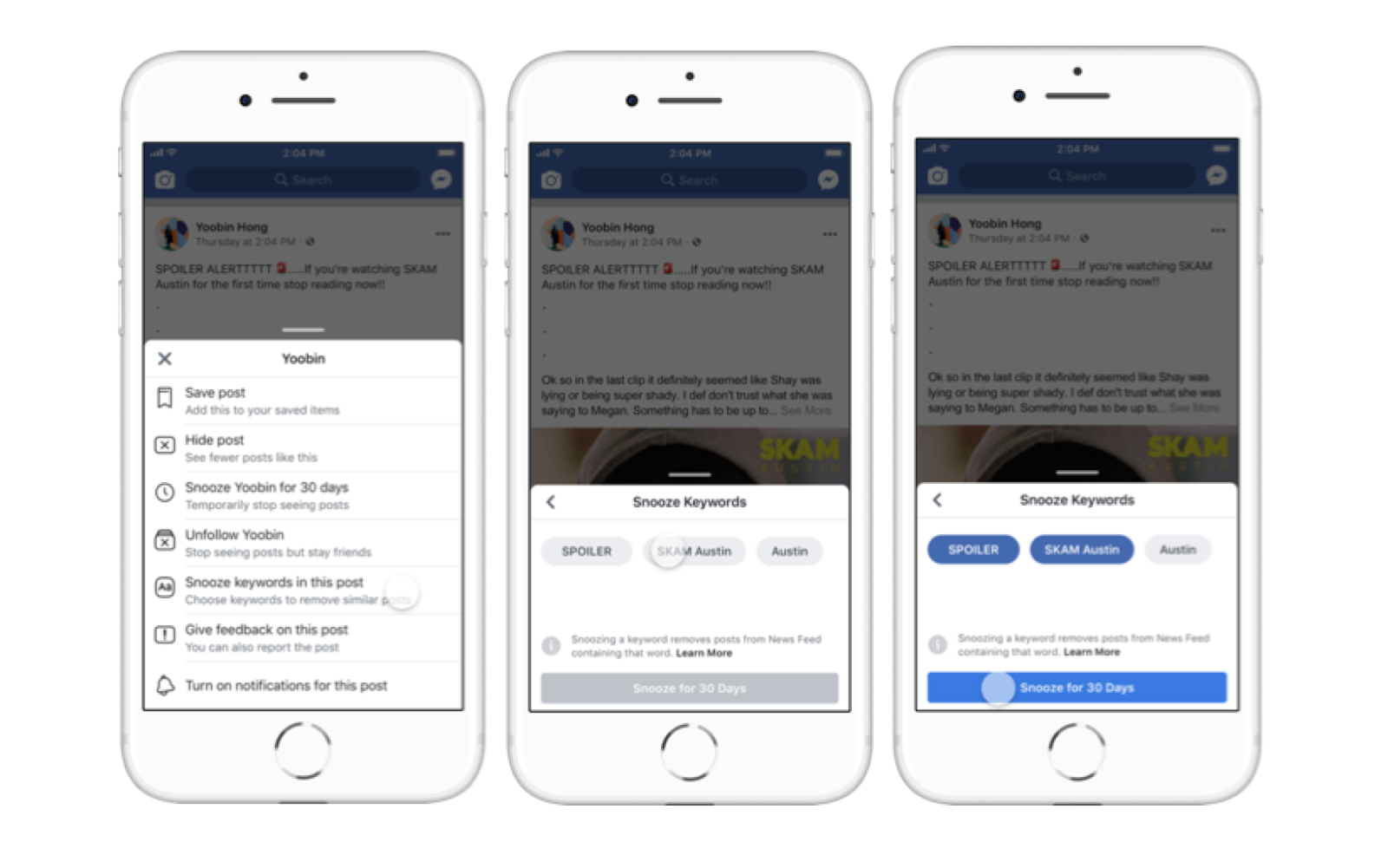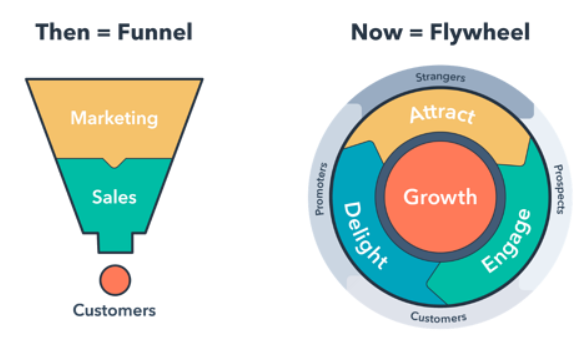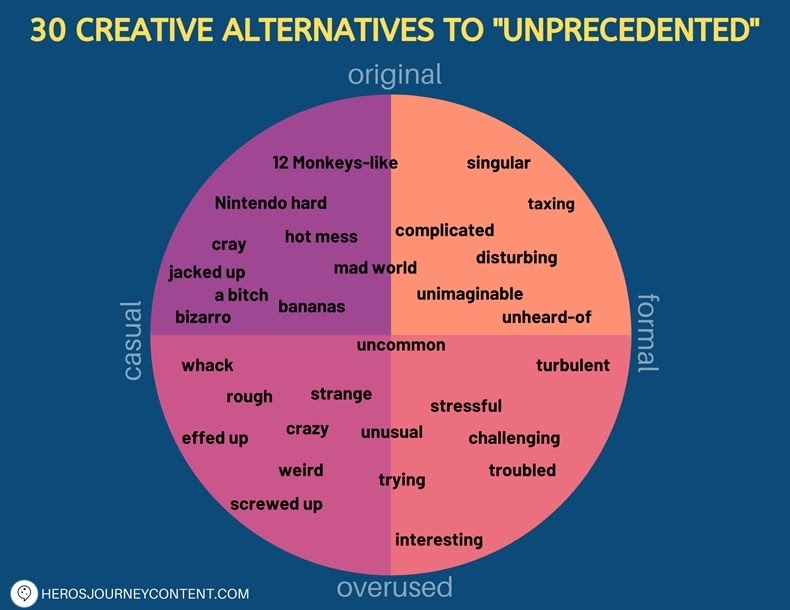For those in the marketing industry, there’s no need for an introduction on this topic.
It’s as if every year, marketers establish a list of words that will entice customers, words that perfectly encompass everything they want and need.
… Then they overuse them. Or, worse, misuse them.
Read on to see the contenders for 2024’s marketing buzzword blacklist.
Top 10 Annoying Marketing Words and Phrases
1. Optimize
This term, in all of its use cases, is like nails on a chalkboard.
Whether you’re being asked to “optimize” search engine rankings, “optimize” user experience, or “OPTIMIZE” mobile, your mood is likely below optimal every time you hear this word.
It might be particularly frustrating because it highlights the pressure put on marketing teams to (miraculously) attract hundreds of new customers by tweaking a few small components.
Things are rarely this simple.
Marketers need the creative freedom to test strategies, assess their success, audit for issues, and redeploy.
Optimizing is a process — not a step — and is often easier said than done.

2. Pivot
This one brings me back to the jazz classes I took as a kid. (Thanks, Mom.)
Admittedly, we’ve done a lot of pivoting the last few years.
Traditional workplaces turned into home offices. Conference room meetings shifted onto Zoom, and water cooler talk was an IM on Google Hangouts.
Companies may have pivoted from providing one service to supporting another in light of the global pandemic. Likewise, people may have had to “pivot” from one industry to another.
But now, we need to pivot from this word and find another way to convey that we are transitioning*.
*Transition is a great example. So is shifting, readjusting, adapting, evolving, transforming, progressing. These are all words with more positive connotations, implying a move forward instead of a neutral pivot.
3. AI
This one has been on our list for years, long before it began appearing on various “Word of the Year” lists last year. And though it’s not inherently off-putting, it’s staying on our list now for the exact same reason it’s always been there: it’s constantly used to describe things that are not, in fact, powered by artificial intelligence.
“AI, in general, is used to describe pretty much any automation feature today,” Loganix CEO Aaron Haynes said years ago. “But claiming that a certain product is AI-powered is far too easy and annoying. A feature that does something on its own is not AI-powered by default.”
Dubbing something “AI-powered” when it’s simply automated was misleading years ago. And now, savvy customers know enough to see through it.
Omitting or overindulging a feature’s capabilities is misleading and can prove consequential to the trust of the customer relationship.
In 2024 and beyond, as the shortest buzzword on this list is sure to remain the most overused as well, let’s hope marketers get a better grip on what AI really means.
(If only there was an AI chatbot out there for marketers to ask about the definition.)
4. Keywords
It wouldn’t be a top ten without a little controversy.
Whether you’re creating an SEO strategy, running Google Ads, or blogging, you’ve likely heard “keywords” too much in the past year.
Don’t get me wrong! Keywords are worth the hype, more so than any other word or phrase on this list.
“Keywords or key phrases are what people are searching for in search engines.
As a business, they’re important because you want to come up in search engines when people search for the keywords or phrases that are relevant to your products or services.”
Yes, keywords are important, crucial, and essential to every marketing strategy.
But, must we be reminded of this every day?
We won’t be able to eradicate this term, as it holds too much weight in the content marketing world. Can we at least agree to use it a little less?

5. Actionable/The next steps…
The problem with these two is not in the word or phrase itself. The issue is that they’re rarely followed by “actionable” “next steps” to take.
That, or the required action/next step is clear and does not require emphasis or restatement.
Either way, the real “next step” is to find a new way to discuss and implement how the project is going to move forward.
6. Top of mind
“Now that we have this top of mind…”
It’s time to do away with this phrase. Forever!
It seems like it’s constantly tacked onto anything even remotely important.
News flash! It’s impossible to keep track of everything we’re expected to keep “top of mind,” especially during a global pandemic.
We have only so much room at the top of our mind after all.
Personally, I no longer have the bandwidth** to keep this phrase in my vocabulary.
**More on this term shortly.
7. Anything related to “funnel” or “pipeline”
These terms are outdated and inaccurate. They refer to the sales process, which starts with a broad audience that becomes more granular as they travel down the buying “funnel” or “pipeline” to eventually generate a sale.
However, anyone who works in marketing knows that the process is not as simple as this analogy suggests.
In reality, it takes various “touches” or interactions — digital and offline — with your brand for a customer to convert.
It’s a lot more complex than a customer coming across your brand and being theoretically pushed through a funnel until they buy your product.
Not to mention, it makes the sales process seem pushy rather than organic. Nurturing the initial interest offers better results due to various positive experiences.
Thankfully, HubSpot (www.hubspot.com) concurs and adapted this concept into a more accurate model: The sales flywheel.

As demonstrated in the image above, the flywheel accounts for customer needs and is focused on providing value to potential leads.
Rather than bombarding customers with gimmicky sales tactics, the flywheel nurtures customer relationships — over and over and over again. It emphasizes the importance of growth and nurture instead of sales.
And with that, let us bury the “funnel”/”pipeline” analogies.
8. Bandwidth
This term is typically used by someone who’s about to throw something extremely tedious onto your plate.
You’ve probably heard, “Do you have the bandwidth to…?”
No, I do not, as I am not a WiFi router.
And even if I were, have you seen how awful the signal is in here? It’s all clogged with projects and meetings.
9. Unprecedented
Imagine having $1 for every time you heard the phrase, “We are living in unprecedented times” since 2020.
We know, and no, this email doesn’t find me well.
We are collectively experiencing a global pandemic, economic concerns, and turbulent political climate. No one could have possibly planned for this, and a year later, we’re exhausted.
Instead, check in outside of work emails.
“How are you? Do you need help with anything? I’m here if you need someone to talk to.”
We are living in a challenging climate (also a set of words to stop using), but kindness and honesty helps more than empty email openers.

10. Branding
I think most marketers agree that there’s a double-sided disdain for this word.
On one hand, it’s often used to justify meaningless tasks. For example, “We should do X, Y, and Z, as a branding exercise.”
On the other hand, we understand the real importance of branding, but people outside of marketing overlook and undermine it.
Too many times has a marketer had to explain the significance of “blogging and creating content marketing to uplift a brand’s voice and provide value to customers.”
We know that branding will not produce immediate sales that most executives want to see. We also know that, in the long term, the foundation of your brand is what attracts — and keeps — customers.
The term “branding” strikes several nerves. So, for the sake of our sanities, please use it wisely.
Note that more often than not, it’s about how and when we use these words. It’s not so much what you say, but how you say it. The saying reigns true in the marketing industry, too.
Before you apologize for these unprecedented times and ask if someone has the bandwidth, think again about these top annoying marketing buzzwords.
SEE FOR YOURSELF
Watch an overview to learn how B2B marketing automation by Mirabel Technologies can help you increase traffic, optimize your funnel, drive more leads, improve conversions, and boost ROI — at a price you can afford!


